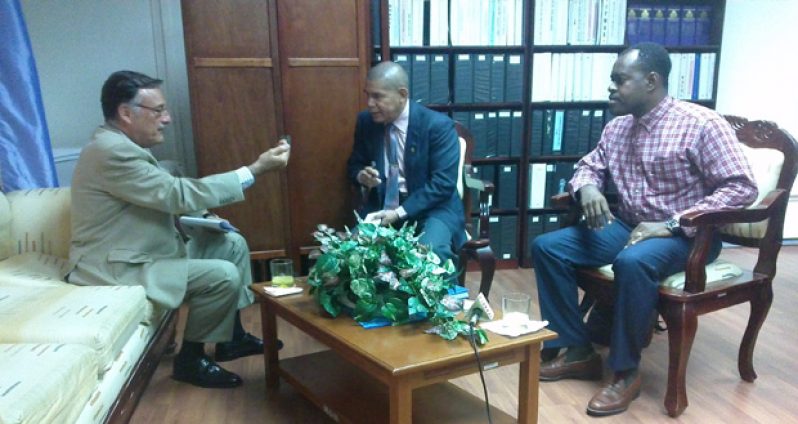ARGENTINE doctors Ana Del Pozo and Sebastian Okanaian will be in Guyana from Sunday, October 11, to Saturday, October 17, to assist the Guyana Blood Programme (GBP) to achieve its quality strategic objectives.The visit is the first leg of a three-year plan drafted through a bilateral -cooperation agreement with Argentina, and the operational departments responsible for the successful execution of the project are the Ministries of Public Health and Foreign Affairs of Argentina, and the Ministry of Public Health of Guyana.
Speaking at a press conference held at his Brickdam office yesterday morning, Minister of Public Health Dr George Norton, lauded the initiative while underscoring its importance to the development of the blood -transfusion sector.
The GBP has outlined four strategies in obtaining Blood Safety until 2020. These include ensuring that blood and blood components are safely collected, processed and appropriately preserved and distributed for transfusion; guaranteeing safety, sufficiency, availability, and efficient and timely access to blood and blood components; providing well qualified transfusion services; and providing well qualified blood donor attention that is accessible to the population and is efficient and safe for the care of voluntary blood donors.
The Argentine team of experts plans to make an auditing of the blood bank with the aim of educational support using Caribbean standards. Visits will be made to hospitals in Georgetown and other regions, including to the New Amsterdam and West Demerara hospitals. Blood transfusion services in Guyana are currently available in Regions 2, 3, 4, 6 and 10.
According to Argentine Ambassador Luiz Alberto Martino, the two doctors scheduled to arrive in Guyana on Sunday come from the “grassroots” in the profession, given that they have practised in some of the most notorious hospitals in Argentina.
The second phase of the project, which will be reeled out in April and May of 2016, involves the training of two Guyanese physicians and two technologists in Argentina at the “Centro Regional de Hemoterapia Garrahan” (CRHC) – Garrahan Regional Centre for Hemotherapy. The tasks to be developed during this time will be guided by a module of quality guarantee programme.
Succeeding this will be the final leg in 2017, which caters for the training of two Guyanese in Argentina. Closure of the cooperation project and the submission of the final learning results will also take effect during 2017.
In the pipeline too, the minister said, is the development of a programme to benefit medical students who would have studied in Spanish-speaking countries. The successful development of this programme will aid candidates in securing spots to pursue post- graduate studies in their area of expertise.
Director of Standards and Technical Services at the Guyana Blood Bank Dr Julian Amsterdam, has revealed that during the course of the visit next week, blood transfusion activities geared towards having an increase in blood drives will be held.
One of the primary goals of these blood drives, Dr. Amsterdam said, is to achieve 100 per cent voluntary donors.
In 2013, 89 per cent voluntary donors were recorded; while in 2014, the figure climbed to 94 per cent. In the first half of 2015, he boasted, 100 per cent voluntary donors were registered.
The director further explained that before persons can donate blood, they must first be screened, so that the bank can achieve “safe blood.” Firstly, verbal screening is done to assess the medical history of the donor.
This is followed by a “check-up,” where, if the person is tested positive for any disease/s, current cough, cold or fever, that person is turned away. Persons who have had high-risk exposure or have had multiple partners are also turned away.
Those with tattoos are temporarily deferred, since a medical examination is needed to assess whether any of them has been infected.
Dr. Amsterdam said one of the most common cases of infection is that of Hepatitis B, which has a long incubation period. What this means is that, months after being infected by a piece of equipment which might not have been properly sterilised, persons can still test negative for Hepatitis B, even though they are positive.
As such, persons with tattoos are treated as special cases and are deferred.
In addition, he noted that lab testing is done for at least eight diseases which can be transferred via blood transfusion.
By Ravin Singh




.png)









